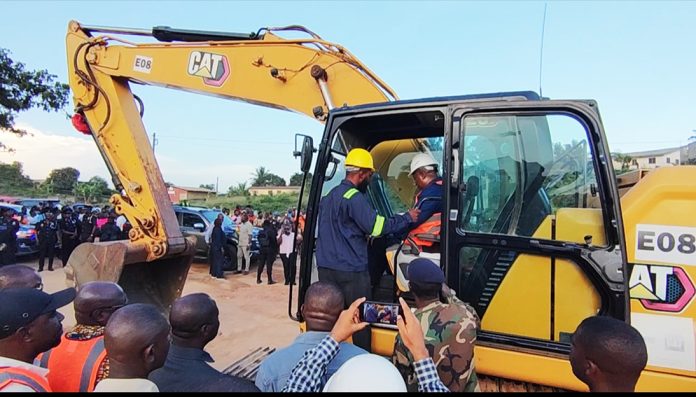President John Dramani Mahama has broken ground for the construction of the 73-kilometre Takoradi–Cape Coast road dualization project, marking a major step in the government’s new $10 billion infrastructure drive, known as The Big Push.
The ceremony, held in Shama, brought together the Minister for Roads, Hon. Kwame Agbodza, Nana Kobina Nketiah V, President of the Western Regional House of Chiefs, Ministers, Members of Parliament and several traditional leaders from the region.
Speaking at the event, President Mahama said The Big Push was conceived to bridge Ghana’s long-standing infrastructure deficit and spur productivity across key sectors of the economy.
He explained that the initiative was inspired by a World Bank report, which estimated that Ghana faces an annual infrastructure shortfall of about $1.5 billion. “We decided that over a five-year period, we must catch up with that deficit and improve infrastructure so that we can increase productivity and expand our economy,” he said.
Under The Big Push, government will invest $2 billion annually for five years in areas such as roads, health, education, sports, agriculture, and the digital economy. According to President Mahama, GH¢13 billion has already been allocated in the current budget to kick-start the first phase, with roads receiving a significant share due to widespread public concern about their poor state.
“Everywhere we visited during the campaign, the major complaint was the poor nature of our roads. Many roads that were in fair condition have deteriorated because they were not maintained — not even potholes patched,” he noted.
The President cited several key projects already underway, including the Accra–Aflao dualization, the Dawhenya–Afienya–Dodowa roads, and the new Cape Coast–Takoradi dual carriageway, which he described as “a critical road that has outlived its usefulness.”
He disclosed that the Western Region is receiving its fair share of national road investments, with projects valued at nearly GH¢7 billion currently ongoing. These include:
Dualization of the Cape Coast–Takoradi road, Rehabilitation and dualization of the Takoradi–Agona Junction road, Construction of the Enchi–Elubo road, Bitumen surfacing of the Asankragua–Agona–Mempahsi–Shipetpai, Asankragua–Fojochrome (Phase 1), and Gravel Yard–Basikese–Sanade roads.
Others are reconstruction of the Atebabu–Santasu–Mumuni Junction road,Rehabilitation of the Esiama–Telekubukazu–Himbeng Junction and Telekubukazu–Anyanase roads.
President Mahama stressed that the huge investments in road infrastructure would be safeguarded through stricter enforcement of axle load and weight restrictions to prevent premature road damage.
“We cannot spend so much building roads only for transporters to overload their trucks and destroy them within a few years. Next year, we will introduce strict weight limitations so that these investments last a lifetime,” he cautioned.
Citing Burkina Faso’s example, where overloaded Ghanaian trucks are now turned away, the President noted that the Roads Ministry would engage transport unions to ensure compliance. “Some trucks in Ghana load up to 120 tons when the legal limit is 50 tons. No road can withstand that,” he said.
President Mahama reaffirmed his government’s commitment to ensuring value for money in infrastructure delivery, describing The Big Push as a “transformational agenda” to modernize Ghana’s economy and improve living standards.
Minister for Roads and Highways, Kwame Agbodza, on his part h praised President John Dramani Mahama’s commitment to transforming Ghana’s road network, describing the government’s “Big Push” infrastructure programme as the most ambitious investment in the nation’s history.
Mr. Agbodza emphasized that the programme would move beyond “talk” to real results, insisting that the selected contractors—many of them Ghanaian—had been properly oriented and were ready to deliver durable, high-quality roads. He cautioned contractors that participation in the Big Push came with high expectations.
“No one is compelling you to be part of the Big Push. But if you choose to, you must be the best. This is your opportunity to build the best roads Ghana has ever seen,” he declared.
The Minister also urged contractors to employ skilled and unskilled youth from the Western Region, particularly graduates in civil engineering, quantity surveying, and project management, to help build local capacity for future maintenance and construction work.
Mr. Agbodza appealed to residents and communities along the project corridors to cooperate with contractors and avoid litigation or obstruction that could delay progress.
“While the President turns the country into a construction field, there will be some discomfort. But no one should take advantage to build in road reservations or stop the work. The law allows for compensation where due, but not for illegal developments,” he cautioned, citing examples of structures built on project rights of way.
He reaffirmed President Mahama’s directive that the dualization project be completed within two years, pledging that no obstacle would derail that target.
For more news, join The Chronicle Newspaper channel on WhatsApp: https://whatsapp.com/channel/0029VbBSs55E50UqNPvSOm2z









